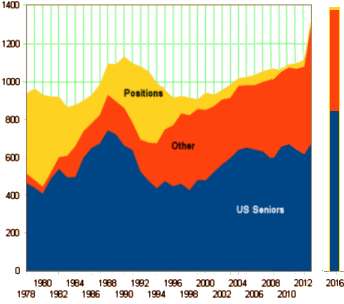by Tara F. Bishop, Joanna K. Seirup, Harold Alan Pincus, andJoseph S. RosHealth Affairs. 2016 35[7]:1271-1277.
A large proportion of the US population suffers from mental illness. Limited access to psychiatrists may be a contributor to the underuse of mental health services. We studied changes in the supply of psychiatrists from 2003 to 2013, compared to changes in the supply of primary care physicians and neurologists. During this period the number of practicing psychiatrists declined from 37,968 to 37,889, which represented a 10.2 percent reduction in the median number of psychiatrists per 100,000 residents in hospital referral regions. In contrast, the numbers of primary care physicians and neurologists grew during the study period. These findings may help explain why patients report poor access to mental health care. Future research should explore the impact of the declining psychiatrist supply on patients and investigate new models of care that seek to integrate mental health and primary care or use team-based care that combines the services of psychiatrists and nonphysician providers for individuals with severe mental illnesses.
MEDPAGETODAYby Neel A. Duggal07·17·2016The number of practicing psychiatrists in the U.S. has stalled over the last decade, in contrast to an upward trend among many other specialties, researchers found. An analysis of data from the Health Resources and Services Administration [HRSA] revealed a 0.2% decline in the number of psychiatrists in practice, compared with increases for neurologists [35.7%], primary care physicians [9.5%], and all practicing physicians [14.2%], Tara Bishop, MD, MPH, of Weill Cornell Medical College, and colleagues reported in the July issue of Health Affairs.
Co-author Harold Pincus, MD, of Columbia University and New York-Presbyterian Hospital, told MedPage Today that more medical school students were going into psychiatry in the 60s and 70s, but there’s been a "generational shift and this proportion has declined. Thus, psychiatrists are not being replaced at a sufficient rate." He offered two potential reasons for this shift: "First, psychiatrists are one of the lowest compensated specialties," he said. "Secondly, there are a greater number of other professionals providing behavioral health services, such as mid-level providers and counselors"… In addition to the overall totals, they saw a 10.2% decline in the median number of psychiatrists per 100,000 residents in hospital referral regions — compared with a 15.8% per capita increase for neurologists, and stable per capita proportions for primary care doctors and all practicing physicians…
The researchers suggested that the decline in psychiatrists might explain "why people report poor access to mental healthcare and why a large portion of psychiatrists are able to sustain practices without accepting insurance."
Petros Levounis, MD, chair of psychiatry at Rutgers Medical School, who wasn’t involved in the study, noted that there have been policy efforts to increase reimbursement for mental health services, such as the Mental Health and Substance Use Disorder Act of 2008 — but its implementation "has been slow," he said. "Reimbursements are very low," Levounis added. "Thus, many psychiatrists don’t accept insurance, such as those in the greater New York area." From his perspective as a medical school instructor, Levounis said that medical students "are initially interested in mental health and addiction. However, as their education progresses, their interest drops significantly"…
Pincus suggested that giving psychiatrists a supervisory role to guide other behavioral health professionals, while diminishing their own face time with patients, may be the best path to managing population mental health. But Levounis disagrees: he believes such a move will online increase the need for psychiatrists. On the other hand, telemedicine may be able to pick up the slack, although it’s "early to tell the success of their outcomes," Levounis said. The researchers concluded that "policy makers, payers, and the medical community simultaneously must develop strategies to enhance recruitment into psychiatry and rapidly develop and effectively disseminate new care models to use the psychiatric workforce more efficiently in the near term."
Co-authors disclosed financial relationships with Medtronic, Johnson & Johnson, and Blue Cross Blue Shield.
 It’s worth reading the brief Wikipedia entry for the Community Mental Health Act of 1963, the last legislation signed by President Kennedy before his assassination – a good idea that never really happened. But as a result, in the days of my Internal Medicine Residency, the government was paying people to go into Psychiatry to deal with the perceived shortage.
It’s worth reading the brief Wikipedia entry for the Community Mental Health Act of 1963, the last legislation signed by President Kennedy before his assassination – a good idea that never really happened. But as a result, in the days of my Internal Medicine Residency, the government was paying people to go into Psychiatry to deal with the perceived shortage. Back then, the need was for physicians [psychiatrists] to staff the mental health centers that were an essential ingredient of the Community Mental Health enterprise. It was actually a good plan in my estimation, though by the time I arrived in the mid·1970s, it was in its waning days – collapsing under the weight of under·funding, under·staffing, and stripped of the necessary hospital backup for stabilization. With the coming of the DSM-III, brain science, and the medicalization of psychiatry, there was the kind of heyday new paradigms often bring. But in general, the relative number of US graduating seniors choosing psychiatry is basically flat compared to other medical specialties.
Back then, the need was for physicians [psychiatrists] to staff the mental health centers that were an essential ingredient of the Community Mental Health enterprise. It was actually a good plan in my estimation, though by the time I arrived in the mid·1970s, it was in its waning days – collapsing under the weight of under·funding, under·staffing, and stripped of the necessary hospital backup for stabilization. With the coming of the DSM-III, brain science, and the medicalization of psychiatry, there was the kind of heyday new paradigms often bring. But in general, the relative number of US graduating seniors choosing psychiatry is basically flat compared to other medical specialties.
These authors mention the low pay and competition from other disciplines as explanatory factors. But those things have always been true and are unlikely to explain the more recent state of the specialty. Of course the number of psychiatrists is falling, but the obvious explanations weren’t mentioned here – things like psychiatrists are only covered by insurance to prescribe medications, and heavily criticized for prescribing too much medication; psychiatrists are not covered to talk to patients, and criticized for not talking to their patients; the upper echelons of psychiatry contain a number of tainted key opinion leaders who have gone over to the dark side and allied themselves with the commercial interests of the pharmaceutical industry; and critics see all psychiatrists as members of this tainted group and are globally contemptuous. That’s just for starters. And, oh yeah, I didn’t take insurance because with that came directives about practice that were unacceptable [and in my opinion, wrong]. I preferred to make less money.
And so the authors suggest the solution is for psychiatrists to no longer see patients or to see them even less, but rather direct treatment from afar by working through a Clinical Coordinator AKA Collaborative Care or literally afar through a computer screen AKA Telepsychiatry. Who wants to spend a career doing either? What patient wants to be treated that way? And the authors’ Conflicts of Interest are telling. Their suggestions are exactly what industry wants from psychiatrists [prescribe meds more rationally than the Primary Care docs do, but don’t get involved with talking to or even meeting with the patients because that runs up costs]. So it looks to me as if they’re using the declining number data to justify directing the specialty even further into exactly what Medtronic, Johnson & Johnson, and Blue Cross Blue Shield want it to be.
The reasons why there are not enough psychiatrists is that nobody is interested in solving that problem. I have been hearing about the “shortage” of psychiatrists for 30 years and in that time have not seen any expansion in residency programs. It is relatively easy to keep the number of specialists constant while rationing the services and replacing them with other staff. The overriding issue is that you don’t need a lot of psychiatrists in heavily rationed systems that are run by managed care and state government bureaucrats. I am always amazed that authors don’t seem to recognize that basic fact. “Underuse” of mental health services occurs because they are rationed in some cases out of existence and the infrastructure is gone.
“But my real reason for writing this is to point out that the policy wonks neither mention the widespread corruption of the academic·pharmaceutical complex nor the ubiquitous inaccurate information about our drugs. That absence in this discussion is particularly striking…”
These were not major factors in whether or not I chose psychiatry. Even with me being significantly more interested in these topics than most of my peers. So I don’t know that I fault them much for omitting them as major factors.
Thanks for another trip down memory lane.
I was unaware of how close together the signing of the MH act and JFKs death were.
It would have been interesting to see what would have happened if he had lived
His sister
was given a lobotomy with severe consequences and his and his brother RFK response to this and MH and DD systems would or might have been game changing.
On another note like the RCC and its import of Catholic priests from Africa and other areas, the docs in Psychiatry are immigrants and bring with them issues.
Many were trained in other specialities and it is obvious their hearts are not truly in the field nor their training. This is a huge but silent problem with minefields on many sides.
The current solution is hogwash.
Before theorizing too much about shrinking shrinks, we need more data. Are overall numbers declining because the 1960s-70s influx is now retiring, a demographic issue? Do med students opt for higher-paid specialties more than they used to? Is it demoralizing to prescribe a few classes of helpful but non-curative and sometimes controversial meds, leaving much of the intellectually and interpersonally satisfying (psychotherapy) practice to others? What is job satisfaction like for most US psychiatrists?
I don’t know the answers to most of the above. But I’m convinced that relegating psychiatrists to administrative and supervisory positions is apt to squeeze the last drops of vitality from the field. It’s the death march of a discipline: from deep human connection with patients, to twiddling with their brain chemistry, to supervising other people’s twiddling. I don’t see “collaborative care” or telepsychiatry sparking enthusiasm. Until miraculous cures are discovered, the only thing that keeps this interesting is the wonder, uncertainty, and complexity of the minds of actual patients in a bio-psycho-social context.
Thanks Steve. Well said…
I only JUST now truly caught the title of the post…
https://m.youtube.com/watch?v=wbVi1UsNhJ8
Not really for this “thread,” but I was reminded of Francis Peabody’s “Care of the Patient” (http://courses.washington.edu/hmed665i/MSJAMA_Landmark_Article_The_Care_of_the_Patient.html By the way, we’re about the same age and seem to have had similar training, career’s etc. I’m only 68 & still going some (private practice). I share your values, laments, but not your predilection for mathematics. best, John N.
Somewhat on topic: The Boston Globe just published its 3rd article in a series on the topic of the shrinking community care system in my state.